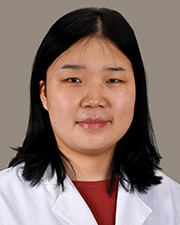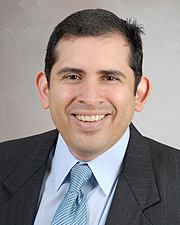Postdoctoral Data Blitz Symposium
|
Absalon Gutierrez, MD |
Van An Duong, Ph.D.
Institute of Molecular Medicine
Functional readouts of the gut microbiome: Opportunities and challenges in metaproteomics
Van An Duong, Ph.D., is a Postdoctoral Fellow in the Center for Translational Cancer Research at the Brown Foundation Institute of Molecular Medicine, UTHealth Houston. He earned his Ph.D. in Pharmaceutical Sciences in 2019 from Gachon University (South Korea). Dr. Duong has expertise in drug delivery, mass spectrometry–based proteomics, metaproteomics, metabolomics, and bioinformatics.
His current research focuses on developing and applying high-resolution mass spectrometry-based proteomic and metaproteomic pipelines to investigate the functional roles of the human gut microbiome in colorectal cancer. In addition, he is involved in developing plasma-based composite biomarkers for the early detection of pancreatic cancer.

Bibek G C, Ph.D.
Department of Microbiology and Molecular Genetics
Editing the uneditable: Unlocking genetics in recalcitrant fusobacterium
Bibek G C, PhD, is a Postdoctoral Research Fellow in the Department of Microbiology and Molecular Genetics at UTHealth Houston. He earned his Ph.D. in Biological Sciences (Microbiology) in 2021 from the University of Southern Mississippi, where he investigated the regulatory role of the msaABCR operon in cell wall integrity, antibiotic resistance, and programmed cell death during biofilm development in Staphylococcus aureus. Dr. G. C. has expertise in bacterial genetics, host–pathogen interactions, anaerobic microbiology, and precision antimicrobial development.
His current research focuses on developing and applying advanced genetic engineering systems to study Fusobacterium nucleatum, a fastidious anaerobe implicated in colorectal cancer. He has created more than ten genetic toolkits—including CRISPR interference platforms, toxin‑based counterselection systems, dual‑inducible expression circuits, and genome‑editing plasmids—that have expanded the experimental capabilities of this previously intractable organism. In addition, he integrates multi‑omics approaches such as RNA‑seq, DNA‑seq, and ChIP‑seq to dissect gene regulation and identify novel therapeutic targets. Dr. G. C. investigates microbial communication, host–pathogen dynamics, and regulatory networks that shape disease progression, with the long‑term goal of transforming engineered microbes into precision cancer‑fighting therapeutics.

Evanta Kabir, Ph.D.
Institute of Molecular Medicine
Microglia activation imaging by TREM2-immunoPET
Evanta Kabir, Ph.D., is a Postdoctoral Fellow in the Center for Translational Cancer Research at the Brown Foundation Institute of Molecular Medicine, UTHealth Houston. She earned her Ph.D. in Inorganic Chemistry in 2019 from the University of Houston, where her research focused on developing novel synthetic methods for preparing redox-active inorganic complexes with platinum (Pt) and iridium (Ir) catalysts.
Evanta has shifted her research focus to radiochemistry at UT Health Houston, working on research and development for radiopharmaceutical applications, including the synthesis and characterization of radioisotope-labeled compounds for imaging and theranostics, such as radiolabeled small molecules, antibodies, and peptides. Her research will evidently support translational research efforts to develop and validate radiochemical methods for preclinical and clinical studies.

Antonio Pagán, Ph.D.
Department of Psychiatry and Behavioral Sciences
Biological liability for autism spectrum disorder: A replicable, heritable, and cognitively-linked neuroanatomical endophenotype
Antonio F. Pagán, Ph.D., is a Licensed Clinical Psychologist and Postdoctoral Fellow in the Department of Psychiatry and Behavioral Sciences at UTHealth Houston. He earned his Ph.D. in Clinical Psychology from Texas Tech University. Dr. Pagán’s research and clinical expertise focus on the transition to adulthood for individuals with Autism Spectrum Disorder (ASD), with a specific emphasis on reducing disparities in underserved Latino populations
Dr. Pagán leads the development and evaluation of culturally adapted interventions, including the ¡Iniciando! la Adultez and Launching! to Adulthood programs, which support young adults with ASD and their families. His work is supported by significant federal and private funding, including an NIH K99/R00 Pathway to Independence Award, an NIH R03 grant, and an Autism Speaks Postdoctoral Research Fellowship. Additionally, his research integrates neuroimaging techniques to evaluate neural mechanisms of change associated with therapeutic outcomes.

Fenfen Wang, PhD
Department of Anesthesiology
Mitochondrial regulation of adipose tissue inflammation and homeostasis
Dr. Fenfen Wang is a postdoctoral research fellow in the Department of Anesthesiology, Critical Care, and Pain Medicine at McGovern Medical School, UTHealth Houston. Her research centers on adipose tissue biology and its role in metabolic diseases, including obesity and related cardiometabolic disorders.
Using integrative approaches that combine in vivo mouse models, single-cell transcriptomics, and molecular and cellular biology, Dr. Wang studies how mitochondrial stress responses in myeloid cells reshape macrophage composition and function, thereby influencing adipose tissue function and systemic metabolism. Her current work focuses on mitochondrial-derived signaling pathways that coordinate immune–metabolic crosstalk and maintain adipose tissue homeostasis under metabolic stress.
Dr. Wang is the recipient of the American Diabetes Association Postdoctoral Fellowship and multiple competitive research awards, including the 2025 President’s Award for Excellence in Postdoctoral Research at McGovern Medical School. She has presented her work at national scientific meetings and has authored peer-reviewed publications in journals spanning metabolism, endocrinology, and immunology.

